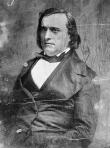The Ostend Manifesto opened with fairly conventional diplomatic language. The United States wanted Cuba for various reasons, including fear that American slaves might get ideas of freedom from a successful slave uprising there. The Manifesto left unstated the desire to revise the Armistice measures in a more pro-Southern direction by bringing in a new slave state to balance out free California, but that kind of thing would be of less interest to the Spanish or other European powers than to men like Soulé and Jefferson Davis. To Spain, sale would offer a chance to free it from its serious foreign debts and engage in internal improvements to put it on a sounder footing in the future.
But what if Spain rejected that generous American offer?
Extreme oppression, it s now admitted, justifies any people in endeavoring to relieve themselves from the yoke of their oppressors. The sufferings which the corrupt, arbitrary, and unrelenting local administration necessarily entails upon the inhabitants of Cuba, cannot fail to stimulate and keep alive that spirit of resistance and revolution against Spain which has, of late years, been so often manifested. In this condition of affairs it is in vain to expect that the sympathies of the people of the United States will not be warmly enlisted in favor of their oppressed neighbors.
Such a nice colony Spain had there. The United States hoped nothing happened to it. A successful uprising would break American hearts, but the Spanish putting it down would break them even more. Don’t take my word for it:
We know that the President is justly inflexible in his determination to execute the neutrality laws; but should the Cubans themselves rise n revolt against the oppression which they suffer, no human power could prevent the citizens of the United States and liberal-minded men of other countries from rushing to their assistance. Besides, the present is an age of adventure, in which restless and daring spirits abound in every portion of the world.
It is not improbable, therefore, that Cuba may be wrested from Spain by a successful revolution; and, in that event, she will lose both the island and the price we are willing now to pay for it-a price far beyond what was ever paid by one people to another for any province.
[…]
It is certain that, should the Cubans themselves organize an insurrection against the Spanish government, and should other independent nations come to the aid of Spain in the contest, no human power could, in our opinion, prevent the people and the government of the United States from taking part in such a civil war, in support of their neighbors and friends.
Men in business suits and fedoras with Tommy guns under each arm couldn’t have said it better. If Spain did not sell, a Cuban revolution would provoke American intervention to ensure its success. Pierce’s invocation of the Neutrality Act amounted to a fig leaf for future filibustering and a part of the carrot for Spain. Washington sent a message that it preferred to buy the island by quashing Quitman, but if purchasing went off the table then purloining took purchase’s place even if that meant war with not just Spain but Spain’s Great Power allies.
The United States went to war with a European power twice in its history to that point, winning the Revolution largely due to the other powers ganging up with it against the United Kingdom and flat-out losing the War of 1812. Now it proposed to take on any combination of empires for the cause of Cuba.
How on Earth did cautious old Buchanan put his name to that? What would prompt any American diplomat, save perhaps Soulé, to propose such an extraordinary course without so much as running it by Washington first? Self-interested national benevolence only goes so far. The fiery, existential language that the Manifesto used to frame American interest in Cuba deserves its own post, which will come Monday.



[…] island by force–the Ostend Manifesto (more at American Presidents Blog: The Ostend Manifesto and The Ostend Manifesto: Deadly Threats | Freedmen's Patrol […]